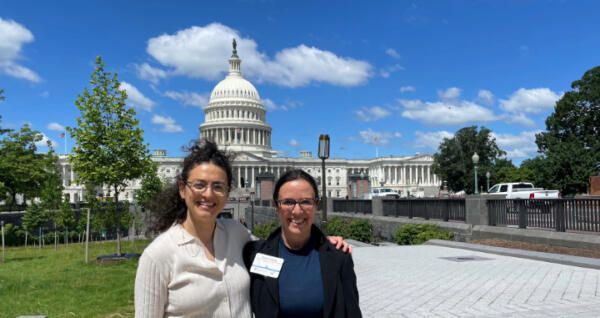Gordon’s Policy Corner, June 2024
As active participants in the 2023-2024 (and maybe into 2025?) Farm Bill process, we work diligently to stay informed and active in developing legislative proposals that affect organic agriculture research, but also the organic ecosystem at large. Part of what we do is participate in coalition lobby days, like earlier in May where OFRF joined members of the Organic Trade Association, like Stonyfield, to make sure we are all consistently engaged with legislators and the organic sector. Two significant developments took place the past two months: Senator Stabenow unveiled the Section-by-Section (SBS) of the Rural Prosperity and Food Security Act, and the House Agriculture Committee passed the Farm, Food, and National Security Act of 2024 (FFNSA). Now that the initial positions have been struck, we’re at a critical juncture in advocating for robust organic research programming.

Dana Bourne, sustainability program manager for Lactalis (Stonyfield)
and OFRF’s Executive Director, Brise Tencer at the OTA Organic Week in DC, May 2024.
Despite some significant improvements included in the Senate SBS for the organic industry at large, including the Coordinating Organic Research Initiative, this framework does not address the critical need of increased budgets for organic research programs. The FFNSA misses its mark even further, only providing flat funding for USDA’s National Institute for Food and Agriculture’s Organic Research and Extension Initiative. Although the safeguarding of agricultural research programs is always important, flat funding at 2018 levels is equivalent to a nearly 25% cut in the program’s effective budget in the current economy due to inflation.
Organic farming systems are inherently designed to enhance local ecosystems through practices like cover cropping, crop-livestock integration, and the use of perennials. These methods have been scientifically proven to increase soil organic matter, improve soil structure, and foster robust microbial communities—all of which are essential for long-term fertility and productivity. Beyond ecological benefits, organic agriculture is a vital economic driver for rural economies, generating higher revenues and supporting local businesses at a rate far exceeding that of conventional farming.
Despite organic products making up 6% of the total food market and over 15% of the produce market, less than 2% of USDA-REE agencies’ budgets are allocated to organic topics. This persistent underfunding risks stifling the growth potential of the organic sector and jeopardizes the competitive edge of the United States in global organic markets.
In light of the demonstrated positive impacts and the increasing consumer demand for organic products, we have authored a letter that over 80 organizations have joined to reiterate the need for the following provisions in the upcoming Farm Bill:
- An annual increase of $10 million for the Organic Research and Extension Initiative (OREI).
- Congressional authorization of the Researching the Transition to Organic Program, starting at $10 million a year and increasing to $20 million in the third year of the Farm Bill.
- An increased budget for the Organic Markets and Data Initiative, along with a mandated report on the economic impact of organic farming on communities.
- The creation of an Organic Research Coordinator position within the Office of the Chief Scientist to enhance the organization and communication of organic research at the USDA.
- The inclusion of climate change adaptation measures and the facilitation of Traditional Ecological Knowledge, ensuring the respect and consent of tribal communities, into legislative priorities for OREI.
As we navigate the legislative process, it is imperative that we, alongside our partners and policymakers, ensure organic agriculture research receives the attention and funding it critically needs. We urge all supporters of sustainable agriculture to join us in advocating for a Farm Bill that reflects the significance of organic farming in today’s food system.
We are grateful for the leadership shown by legislators like those who have cosponsored the SOAR act in the House and the OSRI Act in the Senate addressing these issues, and we look forward to seeing increased collaboration to strengthen organic agriculture research.
We invite you to join us in this critical advocacy effort. Here’s how you can get involved:
Contact your legislators: Urge them to support increased funding for organic research programs. Use this easy Action Alert from the National Organic Coalition!
Spread the word: Share this blog post and information about the Farm Bill with your networks.
Stay informed: Follow our updates on the Farm Bill process and other legislative developments affecting organic agriculture.
We are grateful for the leadership shown by legislators who have co-sponsored the SOAR Act in the House and the OSRI Act in the Senate. We look forward to increased collaboration to strengthen organic agriculture research.
Eat well and breathe deep,
Gordon
gordon@ofrf.org


